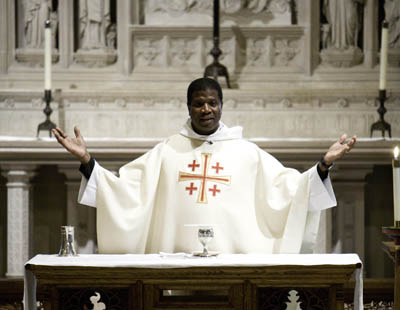(RNS) Conservative commentators like Rupert Murdoch's stable and Ross Douthat of The New York Times are feasting on what they perceive as the “death” of “liberal Christianity.”
They add two and two and get eight. They see decisions they don't like — such as the Episcopal Church's recent endorsement of a rite for blessing same-sex unions. They see declines in church membership. They pounce.
Such “liberal” decisions are destroying the church, they say, and alienating young adults they must reach in order to survive.

(2008) Maryland Episcopal Bishop Eugene Sutton said U.S. conservatives were forced
to forge alliances with Anglican bishops in Africa over homosexuality because they were not able to
find black allies at home.
Never mind that surveys of young adults in America show attitudes toward sexuality that are far more liberal than those of older generations. Never mind that conservative denominations are also in decline.
Never mind — the most inconvenient truth — that mainline denominations began to decline in 1965, not because of liberal theology, but because the world around them changed and they refused to change with it.
Conservatives' anti-change attitudes not only prevented necessary responses to a changing world, but their sky-is-falling venom fed a public perception of mainline churches as argumentative, judgmental, dull and old. It is that perception that young adults are shunning.
What changed in the 1960s? Everything. Urban neighborhoods lost population to white-flight suburbs. Children and parents lost interest in the old neighborhood church. Women entered the workforce en masse. Sunday became at-home family time.
Denominations were slow to establish suburban congregations. In a fundamental management failure led by the anti-change cadre, mainline churches tried to preserve a neighborhood ethos. When they did establish suburban churches, their efforts tended to be hesitant, under-funded, and focused on replicating old ways, rather than responding to realities of suburban living.
Even as women were entering other male bastions, conservatives resisted opening ordination to women. Even as new cultural languages and forms were emerging, conservatives fought any adaptation of mainline liturgies and hymnody. As people sought new expressions of faith in response to changing times, traditionalists mocked “renewal” as “happy-clappy.”
It was those fights that drove people away. It was also the looking-backward attitudes that prevented church leaders from responding to cultural shifts, many of them painful, such as decimation of the middle class, collapse of disposable income for all but the very wealthy, collapse of employment and safety nets, and eroding infrastructure such as public schools.
In time, many mainline Protestant churches became precious enclaves of old people doing old things. We were still arguing about paint colors when people needed us to help them find new purpose and confidence.
Neither do Douthat and Murdoch's mouthpieces understand the present moment. Mainline Protestant church leaders are finally getting ready to do what they should have been doing for 50 years, namely, looking outside their walls at a deeply troubled world, resolving to turn their congregations toward being responsive and effective, and allowing young adults into leadership.
The Episcopal Church's decision on same-sex blessings wasn't a leap beyond; it was the last gasp of old ways of thinking, namely, that Sunday worship and in-house protocols are what matter.
Now leaders can look outward and onward. Conservatives will find themselves ignored, not because mainline traditions have lost their way, but because they are determined to find their way, and my-way-or-the-highway conservatives have cried wolf too often.
Their next round of emotional and financial blackmail won't find much of an audience, except, of course, on the op-ed page of The Wall Street Journal.
(Tom Ehrich is a writer, church consultant and Episcopal priest based in New York. He is the author of “Just Wondering, Jesus” and founder of the Church Wellness Project. His website is www.morningwalkmedia.com. Follow Tom on Twitter @tomehrich.)
DSB/AMB END EHRICH





